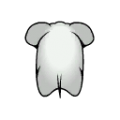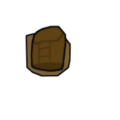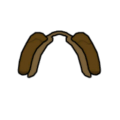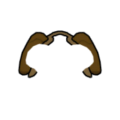Difference between revisions of "Elephant"
| (43 intermediate revisions by 12 users not shown) | |||
| Line 1: | Line 1: | ||
| − | + | {{infobox main|animal | |
| − | + | | page verified for version = 1.3.3101 | |
| − | |name = Elephant | + | | name = Elephant |
| − | |image = Elephant.png | + | | image = Elephant.png |
| − | |description = | + | | description = The largest unmodified land animal. Elephants has a long trunk they use to manipulate objects, and sharp tusks they use to gore attackers. A dead elephant's valuable tusks can be recovered by butchering it.<br>Intelligent creatures with complex social relationships, elephants can be used as pack animals or trained to carry out the most complex of tasks. They live a long time, and are known to remember events and relationships from many decades before. |
| − | |type = | + | | type = Animal |
| − | | | + | | movespeed = 4.8 |
| − | |bodysize = 4 | + | | min comfortable temperature = -12 |
| − | |healthscale = 3.6 | + | | max comfortable temperature = 50 |
| − | | | + | | flammability = 0.7 |
| − | | | + | | marketvalue = 600 |
| − | | | + | | filth rate = 24 |
| − | | | + | | ridingspeed = 1.3 |
| − | | | + | | herdanimal = true |
| − | | | + | | combatPower = 260 |
| − | | | + | | bodysize = 4 |
| − | | | + | | healthscale = 3.6 |
| − | | | + | | hungerrate = 1.605 |
| − | | | + | | diet = herbivorous |
| − | | | + | | leathername = elephant leather |
| − | | | + | | wildness = 0.75 |
| − | | | + | | manhuntertame = 0 |
| − | | | + | | manhunter = 0.5 |
| − | | | + | | trainable = advanced |
| − | | | + | | mateMtb = 12 |
| − | | | + | | packanimal = true |
| − | | | + | | gestation = 13.32 |
| − | | | + | | offspring = 1 |
| − | |livesin_aridshrubland = | + | | lifespan = 50 |
| − | |livesin_tropicalrainforest = | + | | juvenileage = 0.3 |
| − | | | + | | maturityage = 0.666 |
| − | }} | + | | tradeTags = AnimalUncommon |
| − | Elephants are large land animals often found in | + | | attack1dmg = 25 |
| − | + | | attack1type = Scratch | |
| + | | attack1cool = 2.6 | ||
| + | | attack1part = tusk | ||
| + | | attack2dmg = 25 | ||
| + | | attack2type = Stab | ||
| + | | attack2cool = 2.6 | ||
| + | | attack2part = tusk | ||
| + | | attack3dmg = 16.9 | ||
| + | | attack3type = Blunt | ||
| + | | attack3cool = 2 | ||
| + | | attack3part = front left leg | ||
| + | | attack4dmg = 16.9 | ||
| + | | attack4type = Blunt | ||
| + | | attack4cool = 2 | ||
| + | | attack4part = front right leg | ||
| + | | attack5dmg = 14 | ||
| + | | attack5type = Blunt | ||
| + | | attack5cool = 2 | ||
| + | | attack5part = head | ||
| + | | attack5chancefactor = 0.2 | ||
| + | | livesin_aridshrubland = 0.5 | ||
| + | | livesin_tropicalrainforest = 0.5 | ||
| + | | livesin_tropicalswamp = 0.5 | ||
| + | }} | ||
| + | '''Elephants''', called '''elephant calves''' as babies, are large land [[animals]] often found in {{Habitats}}. They have [[elephant tusk]]s, which they use to fight in melee. | ||
| − | == | + | == Summary == |
| − | {{ | + | When an adult male elephant is butchered, it yields {{icon small|elephant tusk}} 2 [[elephant tusk]]s, unless the tusk body part is damaged. |
| + | |||
| + | Despite the texture of female elephants showing tusks, and female elephants' ability to attack with tusks, they do not yield them when butchered. It is currently unclear whether the ability for female elephants to attack with tusks, but not yield them on butchering is intentional or a bug. | ||
| + | |||
| + | Elephants can be brought on [[caravan]]s as [[pack animal]]s, they can carry {{P|Pack Capacity}} kg of weight, almost double that of the [[muffalo]]. They can additionally be ridden for up to 130% caravan speed, reached if there is at least 1 elephant per rider. | ||
| + | |||
| + | == Analysis == | ||
| + | Elephants are difficult to tame and eat a high amount of food, but are very powerful animals. They are in the unique position as the only pack animal that can be trained to haul. They can also be ridden in a caravan for extra speed. As a bonus, elephants are great at combat. | ||
| + | |||
| + | Elephants come in herds; hunting 1 elephant may anger the entire herd. In addition, elephants have 50% manhunter on hunt but 0% manhunter on a failed tame. Even if you want to slaughter elephants, consider taming them first. As a plus side, elephant herds are great to use with a [[psychic animal pulser]] or the [[Psycasts#Manhunter pulse|Manhunter pulse]] [[psycast]]{{RoyaltyIcon}}. | ||
| + | |||
| + | ===As an attack animal=== | ||
| + | Elephants are powerful animals, great for [[Defense tactics#Animal melee blocking|damage soak tactics]]. They have a high health, joint second with [[megasloth]]s, but elephants are much easier to tame. In addition, elephants will never go manhunter on a failed taming attempt. | ||
| − | + | However, this comes at the cost of a high hunger rate. This is not usually a problem, as elephants reside in tropical biomes, but can be an issue during a [[toxic fallout]] or [[caravan]] trip. | |
| − | |||
| − | |||
| − | |||
| − | |||
| − | + | {| class="wikitable sortable" | |
| − | {|class="wikitable" | ||
| − | |||
|- | |- | ||
| − | + | ! Animal !! Health Scale !! DPS !! Move Speed !! Hunger rate !! <abbr title="How often the animal forgets a stage of training in days">Training Decay</abbr> | |
|- | |- | ||
| − | | | + | | [[Thrumbo]] || {{Q|Thrumbo|Health Scale}} || {{Q|Thrumbo|Mob Average DPS}} || {{Q|Thrumbo|Move Speed Base}} || {{Q|Thrumbo|Real Hunger Rate}} || {{#expr:12 - 6*{{Q|Thrumbo|Wildness}} round 1}} |
|- | |- | ||
| − | | | + | | [[Megasloth]] || {{Q|Megasloth|Health Scale}} || {{Q|Megasloth|Mob Average DPS}} || {{Q|Megasloth|Move Speed Base}} || {{Q|Megasloth|Real Hunger Rate}} || {{#expr:12 - 6*{{Q|Megasloth|Wildness}} round 1}} |
|- | |- | ||
| − | | | + | | '''Elephant''' || {{P|Health Scale}} || {{P|Mob Average DPS}} || {{P|Move Speed Base}} || {{P|Real Hunger Rate}} || {{#expr:12 - 6*{{Q|Elephant|Wildness}} round 1}} |
|- | |- | ||
| − | | | + | | [[Rhinoceros]] || {{Q|Rhinoceros|Health Scale}} || {{Q|Rhinoceros|Mob Average DPS}} || {{Q|Rhinoceros|Move Speed Base}} || {{Q|Rhinoceros|Real Hunger Rate}} || {{#expr:12 - 6*{{Q|Rhinoceros|Wildness}} round 1}} |
| − | | | ||
| − | |||
| − | |||
| − | |||
| − | |||
| − | |||
| − | |||
| − | |||
| − | |||
| − | |||
| − | |||
| − | |||
| − | |||
| − | |||
| − | | | ||
| − | | | ||
| − | | | ||
| − | | | ||
| − | | | ||
| − | | | ||
| − | |- | ||
| − | |||
| − | |||
| − | |||
| − | |||
| − | |||
|- | |- | ||
| + | | [[Grizzly bear|Bear]] || {{Q|Grizzly bear|Health Scale}} || {{Q|Grizzly bear|Mob Average DPS}} || {{Q|Grizzly bear|Move Speed Base}} || {{Q|Grizzly bear|Real Hunger Rate}} || {{#expr:12 - 6*{{Q|Grizzly bear|Wildness}} round 1}} | ||
|} | |} | ||
| − | |||
| − | {{ | + | ===As a pack animal=== |
| + | Elephants, despite carrying the most out of any [[pack animal]] in the game, are not great pack animals. This is due to their high hunger rate. 1 elephant carries less and eats more than 2 [[muffalo]] or 5 [[alpaca]]. Elephants can be ridden, and the only rideable animal native to the tropics, where their hunger usually isn't an issue. However, any other rideable animal would be better on a caravan (2 [[donkey]]s can carry 2 people, 1 elephant can carry 1 person). | ||
| + | |||
| + | In addition, elephants are the only pack animal that isn't a [[pen animal]]. For the sole purpose of packing goods, this is a downside, as elephants need to be re-trained. On the flip side, this allows elephants to be a pack animal that fights enemies and hauls goods. | ||
| + | |||
| + | == Training == | ||
| + | {{TrainingTable}} | ||
| + | |||
| + | == Health == | ||
| + | {{Animal Health Table|QuadrupedAnimalWithHoovesTusksAndTrunk}} | ||
| + | |||
| + | == Trivia == | ||
| + | Female elephants don't drop tusks when butchered, despite being able to make tusk attacks in melee and displaying the tusks on their texture. If it is intended for female elephants to not have tusks, this may imply that the elephants in-game are Asian Elephants as tusks aren't a sexually dimorphic trait in African Elephants. | ||
| + | |||
| + | == Gallery == | ||
| + | <gallery> | ||
| + | Elephant east.png|Facing east | ||
| + | Elephant north.png|Facing north | ||
| + | Elephant south.png|Facing south | ||
| + | Dessicated elephant east.png|Decaying | ||
| + | ElephantPack east.png|Packing bags facing east | ||
| + | ElephantPack north.png|Packing bags facing north | ||
| + | ElephantPack south.png|Packing bags facing south | ||
| + | </gallery> | ||
| + | == Version history == | ||
| + | * [[Version/0.12.906|0.12.906]] - Added | ||
{{nav|animal}} | {{nav|animal}} | ||
[[Category:Animals]] | [[Category:Animals]] | ||
[[Category:Pack Animal]] | [[Category:Pack Animal]] | ||
| − | [[Category:Wild]] | + | [[Category:Wild animal]] |
Latest revision as of 11:22, 24 December 2024
Elephant
The largest unmodified land animal. Elephants has a long trunk they use to manipulate objects, and sharp tusks they use to gore attackers. A dead elephant's valuable tusks can be recovered by butchering it.
Intelligent creatures with complex social relationships, elephants can be used as pack animals or trained to carry out the most complex of tasks. They live a long time, and are known to remember events and relationships from many decades before.
Base Stats
- Type
- Animal
- Flammability
- 70%
Pawn Stats
- Combat Power
- 260
- Move Speed
- 4.8 c/s
- Health Scale
- 360% HP
- Body Size
- 4
- Mass - Baby
- 48 kg
- Mass - Juvenile
- 120 kg
- Mass - Adult
- 240 kg
- Pack Capacity
- 140 kg
- Carrying Capacity
- 300 kg
- Riding Speed
- 1.3
- Filth Rate
- 24
- Hunger Rate
- 2.57 Nutrition/Day
- Diet
- herbivorous
- Life Expectancy
- 50 years
- Manhunter Chance
- 50%
- Manhunter Chance (Taming)
- 0%
- Trainable Intelligence
- Advanced
- Wildness
- 75%
- Minimum Handling Skill
- 7
- Mate Interval
- 12 hours
- Maturity Age
- 0.666 years (40 days)
- Juvenile Age
- 0.3 years (18 days)
- Comfortable Temp Range
- -12 °C – 50 °C (10.4 °F – 122 °F)
Production
- Meat Yield
- 560
 elephant meat
elephant meat - Leather Yield
- 160
 elephant leather
elephant leather - Gestation Period
- 13.32 days
- Offspring Per Birth
- 1
Melee Combat
- Attack 1
- Tusk
25 dmg (Scratch)
37 % AP
2.6 second cooldown - Attack 2
- Tusk
25 dmg (Stab)
37 % AP
2.6 second cooldown - Attack 3
- Front left leg
16.9 dmg (Blunt)
25 % AP
2 second cooldown - Attack 4
- Front right leg
16.9 dmg (Blunt)
25 % AP
2 second cooldown - Attack 5
- Head
14 dmg (Blunt)
21 % AP
2 second cooldown
0.2 chance factor - Average DPS
- 5.8156
- tradeTags
- AnimalUncommon
Elephants, called elephant calves as babies, are large land animals often found in tropical rainforests, tropical swamps, and arid shrublands. They have elephant tusks, which they use to fight in melee.
Summary[edit]
When an adult male elephant is butchered, it yields ![]() 2 elephant tusks, unless the tusk body part is damaged.
2 elephant tusks, unless the tusk body part is damaged.
Despite the texture of female elephants showing tusks, and female elephants' ability to attack with tusks, they do not yield them when butchered. It is currently unclear whether the ability for female elephants to attack with tusks, but not yield them on butchering is intentional or a bug.
Elephants can be brought on caravans as pack animals, they can carry 140 kg of weight, almost double that of the muffalo. They can additionally be ridden for up to 130% caravan speed, reached if there is at least 1 elephant per rider.
Analysis[edit]
Elephants are difficult to tame and eat a high amount of food, but are very powerful animals. They are in the unique position as the only pack animal that can be trained to haul. They can also be ridden in a caravan for extra speed. As a bonus, elephants are great at combat.
Elephants come in herds; hunting 1 elephant may anger the entire herd. In addition, elephants have 50% manhunter on hunt but 0% manhunter on a failed tame. Even if you want to slaughter elephants, consider taming them first. As a plus side, elephant herds are great to use with a psychic animal pulser or the Manhunter pulse psycast![]() .
.
As an attack animal[edit]
Elephants are powerful animals, great for damage soak tactics. They have a high health, joint second with megasloths, but elephants are much easier to tame. In addition, elephants will never go manhunter on a failed taming attempt.
However, this comes at the cost of a high hunger rate. This is not usually a problem, as elephants reside in tropical biomes, but can be an issue during a toxic fallout or caravan trip.
| Animal | Health Scale | DPS | Move Speed | Hunger rate | Training Decay |
|---|---|---|---|---|---|
| Thrumbo | 8 | 6.882 | 5.5 | 2.8 | 6.1 |
| Megasloth | 3.6 | 6.126 | 4.8 | 1.6 | 6.2 |
| Elephant | 3.6 | 5.816 | 4.8 | 2.57 | 7.5 |
| Rhinoceros | 3.5 | 5.481 | 5 | 1.71 | 6.6 |
| Bear | 2.5 | 5.375 | 4.6 | 0.56 | 7.2 |
As a pack animal[edit]
Elephants, despite carrying the most out of any pack animal in the game, are not great pack animals. This is due to their high hunger rate. 1 elephant carries less and eats more than 2 muffalo or 5 alpaca. Elephants can be ridden, and the only rideable animal native to the tropics, where their hunger usually isn't an issue. However, any other rideable animal would be better on a caravan (2 donkeys can carry 2 people, 1 elephant can carry 1 person).
In addition, elephants are the only pack animal that isn't a pen animal. For the sole purpose of packing goods, this is a downside, as elephants need to be re-trained. On the flip side, this allows elephants to be a pack animal that fights enemies and hauls goods.
Training[edit]
This animal can be trained as follows:
| Guard: | |
|---|---|
| Attack: | |
| Rescue: | |
| Haul: | |
*As of version 1.1.2610, all animals can be tamed. The percentage of likelihood of success depends on factors such as the Animals Wildness Percentage, Pawn Handling Skill, and others. More information can be found on the animals page.
Health[edit]
| Part Name | Health | Quantity | Coverage[1] | Target Chance[2] | Subpart of | Internal | Capacity[3] | Effect if Destroyed/Removed |
|---|---|---|---|---|---|---|---|---|
| Body | 144 | 1 | 100% | 20% | N/A[4] | - | Death | |
| Spine | 90 | 1 | 3% | 3% | Body | Moving |
−100% Moving[5] | |
| Stomach | 72 | 1 | 3% | 3% | Body | Digestion |
−50% Digestion | |
| Heart | 54 | 1 | 3% | 3% | Body | Blood Pumping |
Death | |
| Lung | 54 | 2 | 3% | 3% | Body | Breathing |
−50% Breathing. Death if both lost | |
| Kidney | 54 | 2 | 3% | 3% | Body | Blood Filtration | −50% Blood Filtration. Death if both lost | |
| Liver | 72 | 1 | 3% | 3% | Body | Digestion |
Death | |
| Neck | 90 | 1 | 32% | 6.4% | Body | Eating Talking Breathing |
Death | |
| Head | 90 | 1 | 80% | 1.28% | Neck | - | Death | |
| Skull | 90 | 1 | 15% | 1.152% | Head | - | Cannot be destroyed Increasing Pain based on damage. | |
| Brain | 36 | 1 | 70% | 2.688% | Skull | Consciousness |
Death Damage always results in scarring. | |
| Eye | 36 | 2 | 6% | 1.536% | Head | Sight |
−25% Sight. −100% if both lost. Damage always results in scarring. 0% Hit Chance against Blunt damage. | |
| Ear | 43.2 | 2 | 6% | 1.536% | Head | Hearing |
−25% Hearing. −100% if both lost. −15 Disfigured Social penalty | |
| Trunk | 54 | 1 | 28% | 7.168% | Head | Manipulation |
−50% Manipulation. | |
| Jaw | 36 | 1 | 28% | 1.4336% | Head | Manipulation |
−50% Manipulation. Can no longer use Bite attack, nor Tusk attack. | |
| Tusk | 72 | 2 | 40% | 2.8672% | Jaw | - | Can no longer use Tusk attack[6] | |
| Front Leg | 108 | 2 | 6% | 5.1% | Body | Moving |
−25% Moving. −50% if both lost | |
| Front Hoof | 36 | 2 | 15% | 0.9% | Front Leg | Moving |
−25% Moving. −50% if both lost. | |
| Rear Leg | 108 | 2 | 6% | 5.1% | Body | Moving |
−25% Moving. −50% if both lost | |
| Rear Hoof | 36 | 2 | 15% | 0.9% | Rear Leg | Moving |
−25% Moving. −50% if both lost. |
- ↑ Coverage determines the chance to hit this body part. It refers to the percentage of the super-part that this part covers, before its own sub-parts claim their own percentage. For example, if the base coverage of the super-part is 100%, and the coverage of the part is 20%, 20% of hits would hit the part, and 80% the super-part. If the part had its own sub-part with 50% coverage, the chances would be 10% sub-part, 10% part, 80% super part.
- ↑ Target Chance is the actual chance for each part to be be selected as the target when each part's coverage has been taken into account(I.E. Neck covers 7.5% of Torso but Head covers 80% of Neck so it actually has only a 1.5% chance to be selected). This is not pure hit chance, as different damage types propagate damage in different ways. See that page for details.
- ↑ Note that capacities can affect other capacities in turn. Only the primary effect is listed. See specific pages for details.
- ↑ This is the part that everything else connects to to be considered 'connected'.
- ↑ If Moving drops below 16% a pawn cannot move.
- ↑ A Scratch/Stab attack of Power 25, Cooldown 2.6
Trivia[edit]
Female elephants don't drop tusks when butchered, despite being able to make tusk attacks in melee and displaying the tusks on their texture. If it is intended for female elephants to not have tusks, this may imply that the elephants in-game are Asian Elephants as tusks aren't a sexually dimorphic trait in African Elephants.
Gallery[edit]
Version history[edit]
- 0.12.906 - Added







